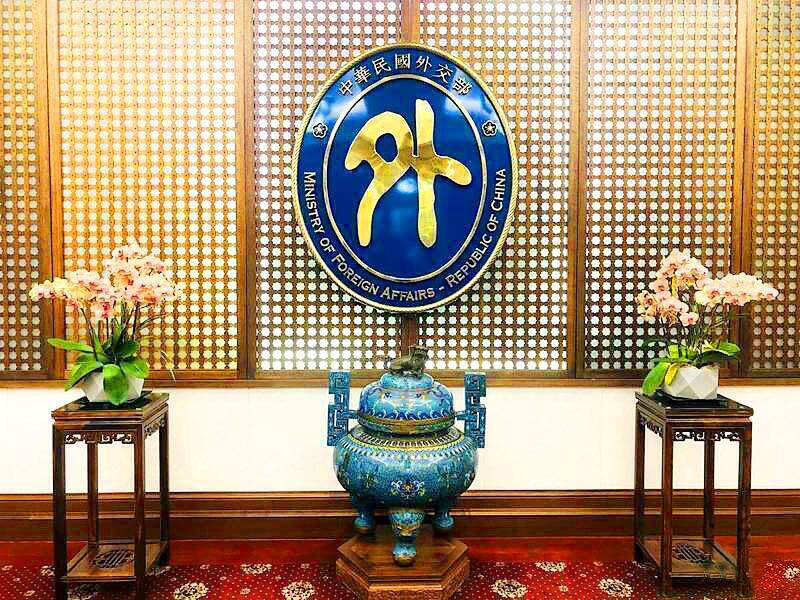The Ministry of Foreign Affairs (MOFA) yesterday condemned China for distorting historical facts and contravening the UN Charter’s provisions in its letter to the UN threatening to invoke the right of self-defense against Japan.
The ministry issued the statement after Chinese Permanent Representative to the UN Fu Cong (傅聰) sent a letter to UN Secretary-General Antonio Guterres claiming that if Japan dares to intervene militarily in the Taiwan Strait situation, it would constitute an act of aggression, and that Beijing would exercise the right of self-defense granted by the UN Charter.
The letter said Japanese Prime Minister Sanae Takaichi committed “a grave violation of international law” and diplomatic norms when she said a Chinese attack on Taiwan could trigger a military response from Tokyo.

Photo: Taipei Times
The ministry yesterday said Fu’s letter is not only arrogant and unreasonable, but also maliciously distorts historical facts and violates Article 2, Paragraph 4 of the UN Charter, which prohibits the use of threats or force in international relations.
“The ministry strongly condemns and refutes it,” it said.
Maintaining peace and stability in the Taiwan Strait has become a strong consensus within the international community, it added.
This includes Germany’s foreign minister, who has repeatedly cited the UN Charter prohibition of the use of force in opposing its use in the Taiwan Strait, and repeatedly emphasizing the importance of peace and stability in the region, the ministry said, adding that these statements highlight the shared values of countries with similar principles, underscoring their commitment to international law and a rules-based international order.
After the end of World War II, the internationally binding San Francisco Peace Treaty replaced the Cairo and Potsdam declarations, the ministry said.
The treaty did not transfer Taiwan to the People’s Republic of China (PRC), and the PRC has never governed Taiwan, it said, adding that therefore, Taiwan is by no means a part of the PRC.
Since the mid-1980s, Taiwan has initiated a bottom-up political liberalization and democratization process, the ministry said.
In 1996, Taiwan held its first direct presidential election, establishing an effective government of the Republic of China in Taiwan, it said, adding that this government is the only legitimate representative of Taiwan in foreign relations.
Only Taiwan’s democratically elected government can represent the nation’s 23 million people in the international community, and in international organizations and mechanisms, it said.
“China has no right to interfere or intervene,” it said.

Auckland rang in 2026 with a downtown fireworks display launched from New Zealand’s tallest structure, Sky Tower, making it the first major city to greet the new year at a celebration dampened by rain, while crowds in Taipei braved the elements to watch Taipei 101’s display. South Pacific countries are the first to bid farewell to 2025. Clocks struck midnight in Auckland, with a population of 1.7 million, 18 hours before the famous ball was to drop in New York’s Times Square. The five-minute display involved 3,500 fireworks launched from the 240m Sky Tower. Smaller community events were canceled across New Zealand’s

The Ministry of Foreign Affairs (MOFA) yesterday said it is closely monitoring developments in Venezuela, and would continue to cooperate with democratic allies and work together for regional and global security, stability, and prosperity. The remarks came after the US on Saturday launched a series of airstrikes in Venezuela and kidnapped Venezuelan President Nicolas Maduro, who was later flown to New York along with his wife. The pair face US charges related to drug trafficking and alleged cooperation with gangs designated as terrorist organizations. Maduro has denied the allegations. The ministry said that it is closely monitoring the political and economic situation

‘SLICING METHOD’: In the event of a blockade, the China Coast Guard would intercept Taiwanese ships while its navy would seek to deter foreign intervention China’s military drills around Taiwan this week signaled potential strategies to cut the nation off from energy supplies and foreign military assistance, a US think tank report said. The Chinese People’s Liberation Army (PLA) conducted what it called “Justice Mission 2025” exercises from Monday to Tuesday in five maritime zones and airspace around Taiwan, calling them a warning to “Taiwanese independence” forces. In a report released on Wednesday, the Institute for the Study of War said the exercises effectively simulated blocking shipping routes to major port cities, including Kaohsiung, Keelung and Hualien. Taiwan would be highly vulnerable under such a blockade, because it

UNRELENTING: China attempted cyberattacks on Taiwan’s critical infrastructure 2.63 million times per day last year, up from 1.23 million in 2023, the NSB said China’s cyberarmy has long engaged in cyberattacks against Taiwan’s critical infrastructure, employing diverse and evolving tactics, the National Security Bureau (NSB) said yesterday, adding that cyberattacks on critical energy infrastructure last year increased 10-fold compared with the previous year. The NSB yesterday released a report titled Analysis on China’s Cyber Threats to Taiwan’s Critical Infrastructure in 2025, outlining the number of cyberattacks, major tactics and hacker groups. Taiwan’s national intelligence community identified a large number of cybersecurity incidents last year, the bureau said in a statement. China’s cyberarmy last year launched an average of 2.63 million intrusion attempts per day targeting Taiwan’s critical